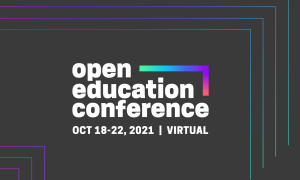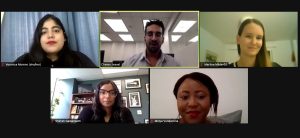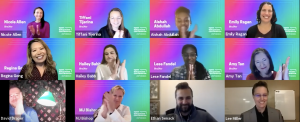The 2021 Open Education Conference drew more than 1,800 participants—an all-time high for  the 18th convening of the annual event held virtually October 18-22. Practitioners, researchers, and advocates from around the world tuned in to share and learn about open educational resources, open pedagogy and open education initiatives.
the 18th convening of the annual event held virtually October 18-22. Practitioners, researchers, and advocates from around the world tuned in to share and learn about open educational resources, open pedagogy and open education initiatives.
OpenEd aims to be a catalyst for educational equity, change, and transformation. Planning for this year’s conference, which featured 500 speakers, emphasized a broad representation of voices. The theme, “Making Open for All,” put action for equity and inclusion at the center of programming. The hope was to empower participants to promote an ecosystem that is innovative and sustainable.
“The conference was not only organized for the community, it was organized by the community,” said Nicole Allen, director of Open Education for SPARC, which was one of the organizational partners supporting the conference.
This year’s community-driven team recruited more than 150 volunteers who reviewed proposals, served on committees, and hosted the conference’s more than 250 sessions. The event was supported by funding from the William and Flora Hewlett and the Michelson 20MM Foundations.
Mays Imad, a neuroscientist and community college educator, gave a keynote address on trauma-informed pedagogy, a burgeoning field during the pandemic. “It was a powerful start to the conference,” Allen said. “It really opened people’s eyes to how trauma responses changed the learning process and generated a lot of awareness about what educators, institutions and students need to understand about the challenging times that we live in.”
This year, one keynote session featured a panel of students that included Chaten Jessel, a senior at the University of Calgary, and first-time OpenEd attendee. After being elected to the student government, he became an advocate for open and successfully lobbied to fund an OER student librarian whose work has already saved students over $150,000 in textbook costs. Jessel shared his experience and said he was grateful to have the opportunity to hear what was happening on other campuses.
at the University of Calgary, and first-time OpenEd attendee. After being elected to the student government, he became an advocate for open and successfully lobbied to fund an OER student librarian whose work has already saved students over $150,000 in textbook costs. Jessel shared his experience and said he was grateful to have the opportunity to hear what was happening on other campuses.
“I truly have not met a group of people so passionate, so successful in my entire life,” said Jessel, who came away from the conference with new ideas about doing a ‘#textbookbroke’ campaign or zero cost textbook program. “There’s so much impact that open education can have. It doesn’t matter where you are, borders kind of disappear. Everybody around the world can benefit from this practice.”
Jessel is eyeing graduate school and hopes to attend OpenEd again next year: “I don’t know where my OER journey will go. But wherever that is, I want to be involved with open education.”
Fellow keynote student panelist Veronica Moreno is a medical doctor in Mexico who is studying international business with hopes of combining her interest with a career in advocacy and public health. She got involved with OER serving through the International Federation of Medical Students’ Association last year, and this was her second OpenEd conference.
“This year’s sessions were inclusive for a lot of people, communities and especially students. It was more comprehensive for students,” said Moreno, who served on the Steering Committee. Moving the sessions until later also accommodated student schedules and led to more being able to participate, she said.
Moreno recognizes the value of OER first-hand, often being required to buy print manuals in medical school with information that quickly became out of date. She would like to collaborate with others in Mexico to promote the open movement more broadly and was inspired by OpenEd 2021.
“I’m super excited because I think that the community is growing every year.” Moreno said. “Most of the people in the community started as students. It’s the youth now who will continue with the movement and be the next leaders.”
Victoria Brame, a librarian who works in community college and K-12 education in Houston, Texas, was a first-time attendee at the conference this year. She volunteered with the communications committee, creating social media posts and blogging about her experience. Brame was a first-generation college student, and sees many at-risk students in her schools who face barriers including the high cost of textbooks.
“As an early professional, I was inspired and empowered by the work that is already going on and am looking for ways that I can contribute moving forward,” Brame said.
Wendy Torres also works with first generation students at Coppin State University in Baltimore where affording textbooks is a big concern. She helped create an OER repository on campus and has provided training for faculty on how to create open materials.
Torres shared her experience as a presenter at OpenEd 2021 and served on the Steering Committee. As a first-time attendee, she said she appreciated the opportunities to get to know participants through the informal gatherings on Zoom after hours and during the morning show.
“There were different ways to engage,” she said. “It’s nice to have the sessions recorded so I can go back and listen later.”
Torres was encouraged to hear from people with a variety of levels of open expertise. She said she left motivated to keep pushing faculty to embrace open, and she hopes to continue to be part of the next conference.
Only a handful were using open textbooks at Maskwacis Cultural College, said Manisha Khetarpal, of the tribal college in Alberta, Canada. Now, open textbooks are the digital curriculum and they helped the college quickly convert face-to-face courses into blended formats. Khetarpal attended OpenEd for the first time this year and provided input from the perspective of indigenous people on the program committee. Now she is spurred to write about the link between indigenous knowledge and open.
“I got involved because open education is so important. It’s about education, equity, and access,” Khetarpal said. Teaching remotely during the pandemic, she had her students do oral interviews with elders and record presentations, in essence, creating digital content. She was interested in reusable assignment sites, and uses open textbooks, adding local context to the content with oral interviews from elders.
“Open education is a new concept among indigenous communities, indigenous institutions, indigenous nations,” she said, adding that OpenEd scholarships allowed many of her students and staff to attend. “In indigenous communities, we say: ‘nothing about us without us.’ And, so in indigenous content, we need indigenous voices. This conference gave us a venue not just to talk about it, but to actually showcase it and to actually implement it, by having my students and instructors participate in the Open Education Conference.”
As dean of English and Communication at Houston Community College, Amy Tan has been attending the OpenEd conference for five years. This was her second year on the Steering Committee and has seen the event evolve and expand over time.
“People in the community, wherever they are in their research or their work, they want to share,” Tan said. “It’s always been an open and welcoming and generous community for me.”
 The Steering Committee worked hard behind the scenes to make the virtual conference engaging and ensure international perspectives, Tan said. “There were opportunities for participation and to exchange. People are looking for ideas to bring back to their institutions,” she said. “The participation of the students this year was just phenomenal. Offering their perspectives, made it an enriched experience for all of us.”
The Steering Committee worked hard behind the scenes to make the virtual conference engaging and ensure international perspectives, Tan said. “There were opportunities for participation and to exchange. People are looking for ideas to bring back to their institutions,” she said. “The participation of the students this year was just phenomenal. Offering their perspectives, made it an enriched experience for all of us.”
James Neal, a senior program officer with the Institute of Museum and Library Services, moderated a panel about federal grants for OER at the conference, his third OpenEd.
Increasingly grants applications to IMLS are coming from a variety of institutions, especially community colleges and Historically Black Colleges and Universities (HBCUs), he said. As higher education expands OER, Neal said libraries remain central drivers of open initiatives and leaders on campuses.
“We are mighty and powerful in our impact. Libraries are such leaders in communities as anchor institutions, as well as community catalysts for initiatives in education and social wellbeing,” Neal said. “There is a lot of room for all sorts of activity in OER from authorship to content curation to copyright issues. We are very excited about the future.”
As for the future of the conference, planning is already underway. With the two-year commitment taken on by SPARC and our partners coming to a close, the conference has developed a new Strategic Vision and is in the process of electing a Board of Directors that will complete the transition to community governance in January 2022.